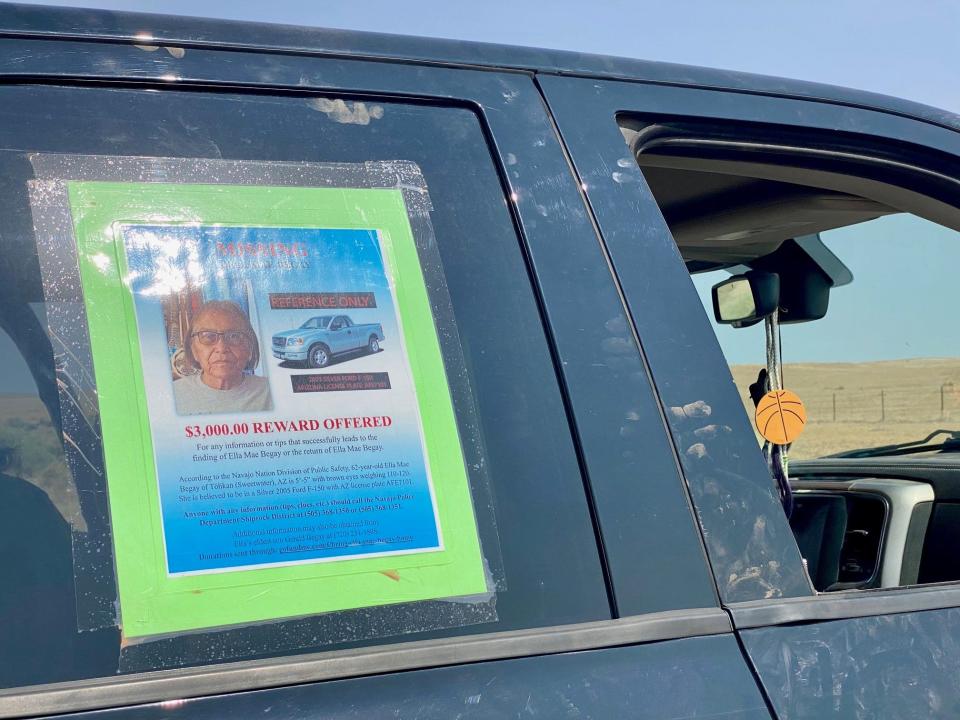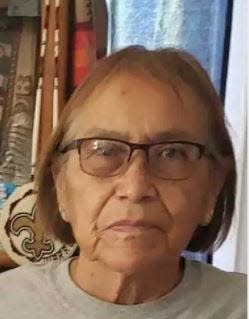FBI offers reward for info on missing Navajo woman; family, friends want authorities to do more
Gerald Begay still texts his mom Ella Mae Begay on her birthday, even as the mystery surrounding her disappearance persists.
The missing persons investigation case remains open on Ella Mae, and Gerald continues trying to live a normal life. Describing a close mother-and-son relationship with Ella Mae, he said it's hard not to be consumed with grief and other emotions when he thinks of what may have happened to his mother. For now, his children and job occupy his days; if it weren’t for them, he said, he wouldn’t be holding it together as well as he is.
“Losing my dad was the worst, but losing my mom is the worst to deal with,” said Gerald in a phone interview while on his break at work. “I am close to my mom. It’s a lot. I’m still here. Still looking forward to getting at least some type of closure, if anything. If not, then at least get the people responsible for this whole situation, and not let it happen again to somebody else because it’s hard.”
Ella Mae Begay has been missing since June 2021, and last week the Federal Bureau of Investigation offered a reward of $5,000 for information leading to anyone involved with her disappearance.
“Offering this reward is a tool we have to further publicize the case with hopes people with any information come forward and share it,” said Kevin Smith, an FBI spokesperson in Phoenix. “No piece of information is too small.”
Ella Mae’s case has become well known throughout the country, which is rare because cases involving missing Indigenous women rarely, if ever, draw much attention. Her case has been one of the many like it that has sharpened the focus on the issue of Murdered & Missing Indigenous Women and Relatives.
Family, lawyer are frustrated by lack of information

Begay, 62 at the time of her disappearance, lived in one of the most remote communities on the Navajo Nation, called Tolikan, or Sweetwater. Her 2005 Ford F-150 truck was seen leaving her home in the early morning of June 15, 2021. Family and authorities believe the truck may have been driven toward Thoreau, New Mexico, and may have gone on to Albuquerque. The truck is gray or silver, with a broken tailgate that would not close, with Arizona license plate AFE7101. It's never been found.
“Due to the fact this is still an open investigation, we can’t share any more information or provide case updates per policy,” said Smith.
But whatever attention the case has received, it's not because of law enforcement authorities, but rather the family and the family’s attorney Darlene Gomez, who has been representing the family pro bono for over a year.
Gomez and Gerald, who is listed as next of kin for his mom, weren’t notified in advance about the FBI's reward, even though Gomez had been trying to get the agency to offer the money since last year.
“They made it hard to contribute that to our situation,” said Gerald. “They should’ve done that a long time ago. It was frustrating.”
Gomez has made a name for herself providing pro bono work for Indigenous families who are missing a loved one. Her work in these types of missing cases has grown and now she represents 18 families, adding on to other non-MMIWR cases at her practice in Albuquerque.
Gomez has documented her many requests to get the FBI and Navajo Nation to put up reward money, one of the many challenges in trying to get more information regarding Ella Mae. Although $5,000 is a lot, she believes more would be enticing for anyone who would have information. She also noted that billboards can make a strong statement.
“Places where there is high poverty, a $5,000 reward or a $10,000 reward could be something a person makes in a whole year,” said Gomez. “The amount that FBI gives out for bank robberies can be like $25,000 to $100,000. Some people who are people of color, especially Native American, their reward for information on their cases are at times a lot lower than people who are not of color.”
'I'm hoping for her to text back'

The process of trying to get reward money from the FBI is not easy. The same issue arose when Gomez tried to get reward money for the case of Jamie Yazzie, a Navajo mom who went missing in 2019. Her remains were found in November 2021 and the case turned from a missing person to homicide.
“It's the calling, and sending the request up the chain of command, and you never really know how things will progress quicker,” said Gomez.
In Jamie Yazzie’s case, Gomez made the request, and it took five months for reward money to be offered. In Ella Mae's case, it’s taken 10 months after the request for reward money.
“They won't ever call you and say, ‘Darlene, we are doing this reward money,’” said Gomez. “You’ll just happen to see it in a Twitter post, or a press release sent to everyone else."
Gerald had last spoken to his mom three days before she went missing to tell her he and his family would be visiting her the following month. COVID-19 had kept him from seeing her for two years and she was excited knowing they would be visiting after such a lengthy time apart, he said.
“I still text my mom on her birthday,” said Gerald. “I’m hoping for her to text back.”
Ella Mae Begay: A Navajo woman is walking to Washington, D.C., to focus attention on her missing aunt
Bringing awareness to his mom’s missing case is important, but he also wants to fix the system. He and his family believe the Navajo police, investigators and leaders derailed the early stages of the investigation.
“Me, as the son of Ella Mae, and the only one out there is Seraphine Warren,” said Gerald. “She has done more than I have because that’s her mission. She wants justice. I’ve been behind her. She has done the same thing of trying to get the reward money and we still have the Go Fund Me.”
Warren had recently finished a four-month prayer walk, starting from her aunt Ella Mae’s home in Sweetwater to Washington, D.C., to bring awareness to the case. While in Washington, she met with Secretary of Interior Deb Haaland. Gerald flew in to meet his cousin and attend the meetings.
“Seraphine definitely has been a powerhouse in advocating for her aunt,” said Gomez. “I also think that when you stand up for the truth, you get people who attack you, because they’re not comfortable with the truth. I think with Seraphine, it's emotionally charging, because on one hand you set out to go out to Washington, D.C., and meet with officials from the U.S. government, but then you are met with resistance for doing that.”
Delegate says families 'deserve better'
Gomez and Gerald said although reward money was promised by the Navajo Nation President’s Office, they have yet to receive the amount promised and they are still waiting. Navajo leadership has been heavily scrutinized on MMIWR cases, more so now as tribal elections near.
Asked about the reward money, President Jonathan Nez said he is committed to the reward funds and his office is working out the details.
Last month, the Albuquerque FBI office released an updated list of missing Indigenous persons in New Mexico and the Navajo Nation. As of Oct. 11, there had been 192 names listed. This latest list reflects the addition of 27 names and the removal of 18 since the list was released in September.
Nez, along with his division directors, and Navajo Police Chief Darryl Noon met recently with officials from Utah's, Arizona's, and New Mexico's U.S. Attorney's Offices, where they issued an executive order to adopt and implement the Navajo Nation Guidelines for Missing Persons. This will be used to investigate and locate missing Navajo persons on the Navajo Nation in a manner that is empathetic to victims and families.
The Navajo Nation Council has also introduced legislation to create a Missing and Murdered Diné Relatives Task Force.
“The Navajo Nation government needs to be accountable when a relative goes missing,” said Council Delegate Amber Kanazbah Crotty. “Far too many families are navigating a broken criminal system and we demand immediate action. We can no longer tolerate the bare minimum for our people because they deserve better.”
Arlyssa Becenti covers Indigenous affairs for The Arizona Republic and azcentral. Send ideas and tips to arlyssa.becenti@arizonarepublic.com.
Support local journalism. Subscribe to azcentral.com today.
This article originally appeared on Arizona Republic: Ella Mae Begay's family fear FBI reward too late after disappearance

